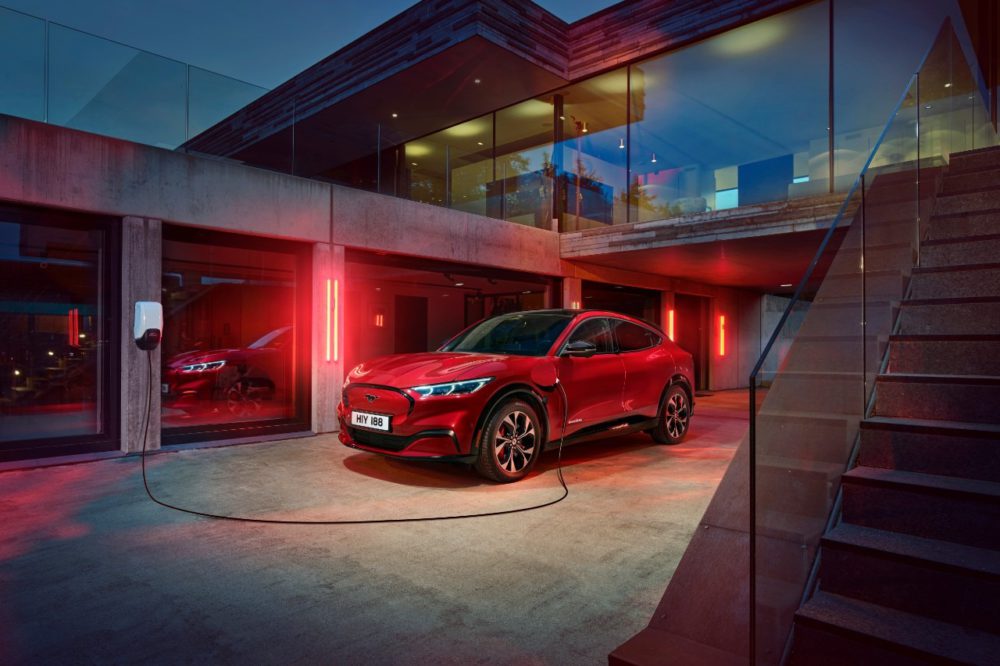Ford Mustang Mach-E recall highlights potential EV confidence issue
21 June 2022

Ford has issued a recall in the US that affects its Mustang Mach-E electric vehicle (EV). The carmaker is citing an issue with the high-voltage battery that can cause a loss of power when driving.
This is not the first time the carmaker has seen one of its EVs subjected to a recall. In 2020, Ford halted sales of its plug-in hybrid (PHEV) Kuga model due to a potential fire risk. The move resulted in the manufacturer pooling with Volvo to meet its year-end emissions targets. The Mustang Mach-E itself has also been subject to five other recalls since its launch, ranging from windscreen bonding issues to software causing unintended acceleration.
‘On affected vehicles, direct-current fast charging and repeated wide-open pedal events can cause the high-voltage EV-battery main contactors to overheat,’ the carmaker announced. ‘This overheating may lead to arcing and deformation of the electrical-contact surfaces, which can result in an electric-relay switch remaining open, or a relay switch that welds closed from heat. An overheated relay switch that opens while driving can result in a loss of motive power, which can increase the risk of an accident.’
The recall affects 48,924 vehicles in the US, built between 2020 and 2022 at the Cuautitlan plant in Mexico, according to CNBC. This is almost half of around 100,000 Mach-E models produced at the plant during that time frame.
Ford has stated that the issue is software related and will be fixed via an over-the-air update or by visiting a dealership. This software patch will be made available to customers in the US in July. Further details about software patches to European vehicles are expected soon.
‘The safety of our customers is a top priority,’ a Ford Britain spokesperson told Autovista24. ‘We realise that vehicle recalls are inconvenient to customers, but they assure that vehicles in service meet customer expectations. We are equally committed to addressing potential issues and responding quickly for our customers.
‘In the affected vehicles, it is possible that the high voltage battery main contactors may overheat, which can result in a contactor failure. If the contactor fails with the ignition off, the powertrain will produce a malfunction warning light and not start. If the contactor fails in motion, a powertrain malfunction warning light will be illuminated, the vehicle will display ‘Stop Safely Now’ in the instrument panel cluster, and the vehicle will experience a loss of power. The vehicle will coast to a stop, and all 12V systems including power brakes and steering will remain functional.’
‘We will be working with authorities on the next steps and have started to inform our dealers. Ford will soon confirm the update and meanwhile customers requiring advice or assistance can contact Customer Relations. Ford is not aware of any reports of accident or injury related to this issue,’ they added.
Confidence in electric vehicles
There have been several recalls related to EVs in recent years, with issues around the high-voltage battery a prominent cause.
Earlier this year, Volkswagen announced around 100,000 PHEVs would be recalled due to a fire risk, with the Passat, Golf, Tiguan, and Arteon models affected, alongside models from Audi, SEAT and Skoda. Last year, Hyundai recalled 82,000 EVs around the world, with a predicted cost of around $900 million (€857 million). BMW has also recalled PHEVs over fire risks.
‘Recalls of this nature do not help consumer confidence in battery technology. That said, it is clear that Ford has pinpointed the problem and is taking steps to remedy the issue, which will give some comfort to current owners,’ stated Jayson Whittington, chief editor, cars and leisure vehicles at Glass’s (part of Autovista Group). ‘It is not only Ford that has suffered issues with battery technology, and it should not be surprising that there are teething problems when relatively new technology moves into volume production.
‘Demand remains very strong for all BEVs, and with current lead times for many models approaching 12 months, it is not uncommon for used examples (including the Mustang Mach-E) to sell for close to the original cost new price. Despite Ford’s setback, it is likely that Mach-E will suffer no impact in residual values, because demand is currently so strong.’
Over-the-air benefits
One advantage of modern vehicles is that connected technologies allow for recalls to be dealt with via over-the-air updates. These software patches, much the same as updates to mobile-phone operating systems, mean drivers do not need to visit dealerships and can continue to use their vehicles – unless there is a critical safety concern.
The prevalence of OTA may mean that recalls become more common. Carmakers can scrutinise reported defects and decide that the best way to avoid problems in further vehicles is to apply a software patch. By issuing a recall, this patch then becomes mandatory for drivers to apply, albeit automatically. Therefore, the way the automotive market thinks about recalls is changing, and it may be something we see more of in the coming months and years, diluting its effects on confidence in models.
Not only does this offer a time-saving benefit to drivers and businesses, it also means carmakers can save money. No additional parts are required, there is no labour cost, and workshops can remain free to repair vehicles suffering from other breakdowns.